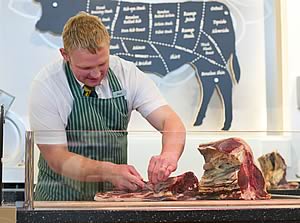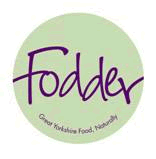2009-10-27
Sunday lunch is the mainstay of Britain’s food culture, and arguably the reason for Yorkshire pudding. Fodder, the flagship food hall and café on the Great Yorkshire Showground, has launched a new club promoting the delights and ethics of traditionally reared Rare Breed meat.
Pioneering Food Hall Champions the Great British Breeds
 |
The Rare Breed Roast Club is a return to how meat used to taste—and offers the chance to buy slower maturing breeds from small scale local farms across Yorkshire.
Heather Parry, the managing director of Fodder explains, “Every week there will be meat from two rare breeds on offer from different farms from across the country and we’ll encourage our customers to swap tasting notes, much like wine clubs. We aim to open the debate on what produces the best crackling, Old Spot or Saddleback? It’s a way of supporting local farmers and offering something unique to shoppers. When you buy Rare Breed meat you’re getting a fully traceable, unique product with a depth of flavour you can’t get in supermarket meat.”
Butcher Paul Nicholson explains “ Traditional or rare breed beef is tight grained rather than loose, deep in colour, it has a texture that literally will melt in the mouth giving a long savoury taste that brings to mind the grasses and cereals the steer will have eaten. Native British breeds--the Shorthorns, Reds and Dexters are ideal for classic British cooking.” Paul is the Head Butcher in the Fodder shop.
“You can really taste the difference in slow matured outdoor reared pork. It makes sense that naturally fed, slowly grown animals that are not stocked in high densities are far more resistant to disease—reducing the need for vaccines and antibiotics.”
“We’ve become so accustomed to buying our meat from the supermarket—using only the choice cuts of quick growing cross breeds we forget the flavour of meat changes not only with breeds but seasonally. The industry tells us consumers want young mild flavoured lamb all year round, supporting the import of New Zealand lamb. I think people are enjoying a return to proper butchery, where we use the whole carcass and have a relationship with our farmers.”
“Hill farmed Yorkshire lamb for instance, really changes with the seasons. In spring it’s delicate and pale pink, but now, we’re stocking “light” lamb with more depth of flavour as well at hogget, which is lamb that is over a year old—which is perfect for low slow winter cooking,” explains Nicholson.
“The benefits of the Rare Breeds Club are twofold, the customer gets to taste a wider variety of great meats and the initiative helps to support small scale farmers in the country find a direct and easy route to market,” concludes Miss Parry.
 Countryside Live 2009 - Successful Show for Seventh Year Countryside Live 2009 - Successful Show for Seventh Year
 Charolais Establish New Stirling £5,687 Record Average Charolais Establish New Stirling £5,687 Record Average
 Aberdeen-Angus Prices Soar at Stirling Aberdeen-Angus Prices Soar at Stirling
|



